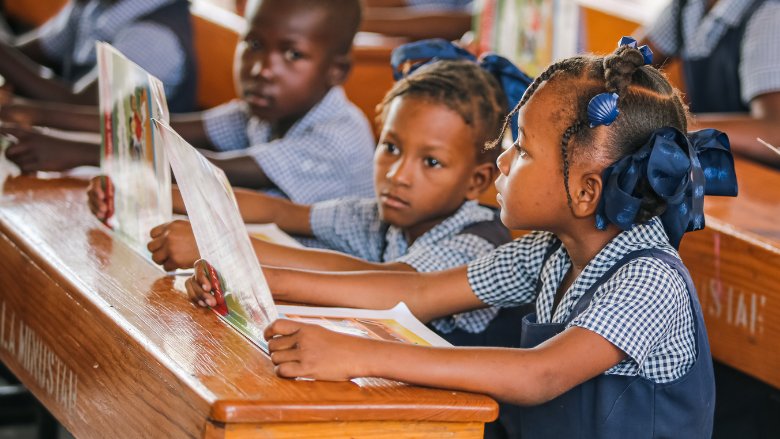"I want to be an agronomist to help my parents and other farmers in my region produce more crops," explains Franco, 14. Franco is not the only young Haitian to dream of his future. "If I become an agronomist, my priority will be to create nurseries to grow trees so we can reforest the region where I live," says Gerson, 12. Rose Berline, 14 years old, shares that she wants "… to help the children in my village stay healthy. That’s why I want to become a nurse."
All three are enrolled at the Lestage Community-Managed Public School, in a rural community located 20 minutes from the small town of Maniche, in the south of Haiti. They are currently in the 4th and 6th grades, with dreams of pursuing professional careers that can help their communities.
Investing in education to strengthen human capital
Haiti has a low level of human capital, which means that its people do not have the optimal health and education to achieve their full potential. According to the World Bank’s Human Capital Index, Haiti ranks 112th out of 157 countries in the world. This index shows that a child born in Haiti today will only be 45% as productive as an adult as she could be if she had complete education and full health. To improve the human capital of Haiti, it is essential to provide better access and quality of health care and education services for its population.
One of the challenges that affects the human capital of Haiti is the high cost of education services relative to the country’s GDP. Haitian parents must pay an average of US$140 per year per child to send them to private primary schools, which make up 80% of the primary education system. However, many Haitians live in poverty and cannot afford this cost. As a result, more than 250,000 children aged 6–11 and about 65,000 youth aged 12–14 are not enrolled in school for financial or other reasons.
Haiti has made some progress in increasing access to basic education in the past decade, but the quality of education remains low and affects learning outcomes. Even though most Haitian students attend school for 11.4 years by the time they are 18 years old, this is equivalent to only 6.3 years of effective education, taking into account the quality of learning. This means that many students do not acquire the skills and knowledge that they should have at their grade level. Many students are also older than their classmates because of delays, gaps in school attendance, and high repetition rates.
There are several other factors that contribute to the low quality of education and other basic services in Haiti, such as the lack of qualified, trained, and motivated staff; the scarcity or poor quality of inputs (such as textbooks); the absence of standards and accountability for quality; and the limited regulation of nonpublic services.
Promote access to education to fight poverty
To allow children such as Franco, Gerson, or Rose Berline to envision a better future and climb the social ladder, the World Bank has been providing continued support to Haiti’s education sector for decades, with current ongoing financing of US$ 105.6 million during 2022–2026.
This financial support, which will last for four years, will enable the restoration and construction of school facilities that were damaged by the earthquake on August 21st and provide access to basic education with better learning conditions for more than 150,000 Haitian children in a total of 263 public schools and 111 non-public schools in the Southern region, of whom about 69,000 are girls. Students in public schools receive textbooks and kits, nutritional support, and school furniture. Students in nonpublic schools receive free education with learning conditions that meet basic operational criteria. These schools also receive system-level support.
“The pupils receive a full hot meal daily, which increases their motivation for school participation”, said Rose Anna Amazan, principal of the Mersan (Camp Perin), national school. “The canteen is really making a big difference in the learning aptitude, and we can assess the improvement in the results.”
At the system level, World Bank financing is supporting the development of various components to enhance the quality and equity of education, such as a national assessment framework, improved data collection and management through an Education Management Information System, classroom pedagogy assessment, teacher coaching support, accreditation of nonpublic schools for quality assurance, the development of a national school infrastructure financing strategy, decentralized governance, improved governance of the non-formal sector, and inclusion in education.
This additional investment in human capital is supporting the government’s effort to improve learning outcomes for children such as Franco, Gerson, and Rose Berline by building a more equitable, modern, and resilient education system.

